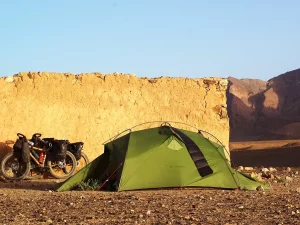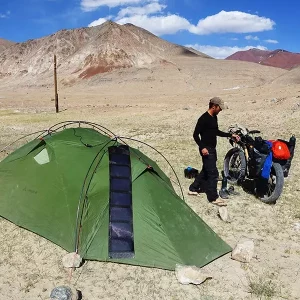It’s decided, you’re embarking on the adventure of a lifetime! You’re going hiking and planning your first camping. Congratulations! But before you hit the trails, here are some essential tips and equipment suggestions that will help ensure your adventure is safe, enjoyable, and memorable.
Essential equipment for a successful camping experience
Portable solar charger
Staying connected and powered up during your camping is crucial, especially if you rely on electronic devices for navigation, communication, or capturing memories. A portable solar charger is light, powerful, and compact, making it an invaluable piece of equipment. It can charge your iPhone, smartphone, GoPro, or drone, ensuring you stay powered up even in the most remote locations.
Sleeping bag and mattress
For those who prefer not to sleep directly under the stars, a sleeping bag and a self-inflating mattress are essential. Opt for lightweight models that take up minimal space in your backpack. A good sleeping bag will keep you warm, while a self-inflating mattress provides comfort and insulation from the ground.
Tent
A tent is another crucial piece of equipment. Choose one that fits your needs and budget, keeping in mind that tents come in various sizes, accommodating 2, 3, or even 4 people. Ensure your tent is easy to set up and provides adequate protection against the elements.
Stove
For your evening meal, a stove is indispensable. If you plan to stay outside for just one night and the temperatures are moderate, a gas stove is a convenient option. For longer stays or colder conditions, consider a wood or oil stove. These provide a reliable heat source for cooking and warmth.
Spare clothing and weather protection
Pack spare items such as a t-shirt, sweater, and socks, and include clothing to protect against weather changes (rain, wind, snow). Sunglasses, sunscreen, a cap, dressings, and a flashlight are also essential items. Don’t forget to pack enough food to keep your energy levels up throughout your adventure.
Choosing the right location and setting up your tent
Location selection
When selecting a spot to set up your tent, be mindful that camping is often regulated by legislation. Research the rules and regulations in your chosen area before setting out. Aim for a flat, dry area away from wetlands to avoid damp conditions and potential disturbances from local wildlife, such as cows or sheep.
Setting up your tent
Once you’ve chosen your location, clear the area of any debris like tree branches or stones. Practice setting up your tent at home if you’re not experienced, as this will save time and reduce frustration in the field. Set up your tent well before nightfall and position the entrance away from the wind to ensure a comfortable and safe shelter.
 The USB solar panel
The USB solar panel
Ultra-light PT12 Powertec foldable 12V solar charger
For your first camping , you’ll likely want to document your journey and capture the stunning landscapes you encounter. Bringing along a portable solar panel is an excellent way to ensure your electronic devices remain charged. The PT12 Powertec foldable solar charger is ultra-light, unbreakable, and water-resistant. It’s compatible with USB and 12V connections, allowing you to maintain energy autonomy throughout your trip.
Buy our gear now
Benefits of a solar panel
The solar panel converts sunlight into electricity, recharging all your devices with a USB port, including smartphones, cameras, drones, and GPS units. Some models, like the PT12, feature dual 5V and 12V outputs and MPPT electronics that optimize voltage drops and efficiency, even in cloudy conditions. With a solar panel, you’ll never run out of power, ensuring you can capture every moment and share your adventures with friends.
Preparing for unexpected situations
While planning your bivouac, it’s crucial to prepare for unexpected situations. Pack a first aid kit with essentials like bandages, antiseptic wipes, pain relievers, and any personal medications. Knowledge of basic first aid can be invaluable in case of minor injuries. Additionally, consider bringing a multi-tool or a Swiss Army knife, which can come in handy for various tasks, from cutting rope to preparing food.
Staying informed and connected
Ensure you have a reliable way to stay informed about the weather and other potential hazards. A portable weather radio can provide updates on changing conditions, helping you make informed decisions about your bivouac plans. For added safety, a GPS device or a map and compass are essential for navigation, especially in remote areas where cell service might be unreliable. Having a means of communication, such as a fully charged mobile phone or a satellite communicator, ensures you can call for help if necessary.
Enjoying the experience
camping offers a unique opportunity to immerse yourself in nature and experience the great outdoors in a new way. Take time to enjoy the peace and tranquility that comes with being away from the hustle and bustle of daily life. Whether you’re stargazing, listening to the sounds of the forest, or simply enjoying the company of your fellow adventurers, a camping can be a deeply rewarding experience. Remember to leave no trace, respecting the environment by cleaning up after yourself and preserving the natural beauty for future adventurers. By following these tips and embracing the spirit of adventure, you’re sure to have an unforgettable bivouac experience.
Embarking on your first. camping is an exciting adventure filled with new experiences and challenges. By preparing thoroughly and equipping yourself with the right gear, you can ensure your trip is safe, comfortable, and enjoyable. Remember to pack essential items like a portable solar charger, sleeping bag, tent, and stove, and choose your campsite carefully. With these tips and tools, you’re ready to explore the great outdoors and create unforgettable memories. Happy camping!

 The USB solar panel
The USB solar panel